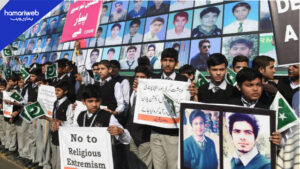Jamaat-e-Islami Nationwide Shutter Down Strike on August 28, 2024: Latest Updates
-
Syeda Qandeel Zehra
-
- Published August 28, 2024

Jamaat-e-Islami (JI) has intensified its efforts to address the severe economic challenges facing the nation by calling for a nationwide shutter-down strike on August 28, 2024. This move follows a series of protests and public outcries over skyrocketing power tariffs and contentious Independent Power Producer (IPP) agreements.
JI Shutter Down Strike: A Response to Economic Hardships
The call for a nationwide strike is a significant escalation in JI’s campaign to pressurize the federal government into implementing more substantial relief measures for the general public. Rising inflation, exorbitant electricity prices, and oppressive taxation have sparked widespread discontent, leading JI to mobilize the business community and the general public for this shutter-down strike.
Nationwide Strike to Amplify Public Concerns
In a recent press conference held in Islamabad, JI leader Siraj ul Haq announced that the business community has unanimously supported the strike. The consensus reflects the growing frustration among businesses and citizens alike, who are grappling with the burden of rising costs and diminishing purchasing power.
JI’s Demands and Expectations
Jamaat-e-Islami’s leadership is pushing for the federal government to take immediate action to alleviate the economic strain on the population. The party’s demands include revising the current electricity pricing model, renegotiating IPP agreements, and reducing the overall tax burden. The shutter-down strike seen as a critical step in amplifying these demands and forcing the government to respond.
Public and Business Community Involvement
The nationwide strike expected to see widespread participation from various sectors, with businesses across the country closing their doors in solidarity. The strike anticipated to send a strong message to the government, highlighting the urgency of addressing the economic issues that have severely impacted both businesses and households.
What to Expect on August 28
As the date for the strike approaches, tensions expected to rise, with potential disruptions in daily activities across major cities. The success of the strike will largely depend on the level of participation and the government’s response in the coming days. Jamaat-e-Islami remains steadfast in its commitment to achieving meaningful economic reforms, with the shutter-down strike serving as a pivotal moment in its ongoing campaign.
Stay tuned for more updates on the Jamaat-e-Islami shutter-down strike and its impact on the nation’s economic landscape.









Leave a Reply